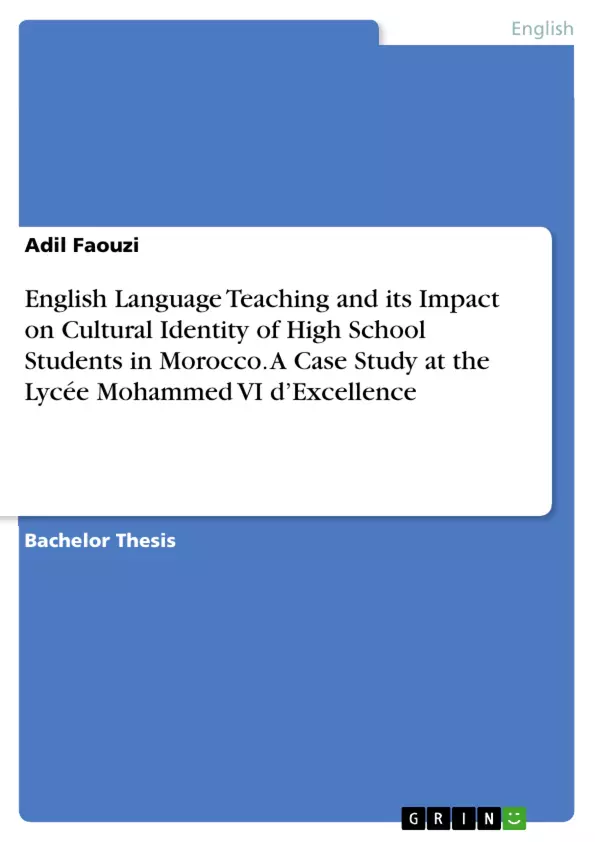This thesis investigates the influence of English language teaching, as a language of globalization, on the cultural identity of high school students in Morocco. Against a backdrop of a complex linguistic landscape, this study navigates the intricacies of language, culture, and education, aiming to contribute to the ongoing discourse surrounding the role of English in a globally connected world. A mixed-methods approach, comprising a questionnaire for students and interviews with teachers from Le Lycée Mohammed VI d'Excellence in Morocco, is utilized for a comprehensive exploration of the research question.
While the majority of students reported no direct impact of English language teaching on their cultural identity, a subtle, layered influence was observed through their adoption of Western cultural norms. On the other hand, teachers displayed an acute awareness of the significant influence of globalization on teaching English, emphasizing the intricate link between language and culture. They highlighted the role of English as a conduit for intercultural communication and as a critical tool for fostering cultural understanding. The findings signal both challenges and opportunities, reinforcing the essential role of teachers in facilitating language learning and intercultural competence in an interconnected educational landscape. This monograph underscores the need for further research to delve into the subtleties of students' perceptions and to navigate the complexities inherent in teaching English in a globalized environment, ultimately aiming to offer empirical and theoretical contributions that inform policy and practice in the field of English language teaching.
Inhaltsverzeichnis (Table of Contents)
- ABSTRACT
- ABSTRACT (FRENCH)
- ABSTRACT (HEBREW)
- LIST OF FIGURES
- LIST OF TABLES
- LIST OF ABBREVIATIONS
- DEDICATION
- ACKNOWLEDGMENTS
- INTRODUCTION
- LITERATURE REVIEW
- Introduction
- Defining Cultural Identity
- English Language Teaching in Morocco
- Globalization and Education
- Globalization and Culture
- Globalization and Language Teaching
- Language and Cultural Identity
- The Impact of English Language Teaching on Cultural Identity
- Strategies for Integrating Culture and Language Teaching
- Content-Based Instruction (CBI)
- The Intercultural Approach
- Task-Based Language Teaching (TBLT)
- Cultural Projects and Collaborative Learning
- Study Abroad and Exchange Programs
- Conclusion
- METHODOLOGY
- Introduction
- Research Hypotheses
- Research Design
- Research Instruments
- Participants
- Sampling
- Ethical Considerations
- Data Analysis Techniques
- The impact of English language teaching on cultural identity
- The relationship between language and culture in the context of globalization
- The role of teachers in facilitating language learning and intercultural competence
- The challenges and opportunities presented by teaching English in a globalized environment
- The need for further research to deepen understanding of students' perceptions and navigate the complexities of English language teaching in a globalized world
Zielsetzung und Themenschwerpunkte (Objectives and Key Themes)
This monograph aims to investigate the influence of English language teaching on the cultural identity of high school students in Morocco. The study examines the complex interplay of language, culture, and education in a globalized context, exploring the role of English as a language of globalization.
Zusammenfassung der Kapitel (Chapter Summaries)
The monograph begins with a comprehensive literature review, delving into key concepts like cultural identity, English language teaching in Morocco, globalization's impact on education and culture, and the intricate relationship between language and cultural identity. The review also explores strategies for integrating culture and language teaching, including Content-Based Instruction (CBI), the Intercultural Approach, Task-Based Language Teaching (TBLT), cultural projects, and study abroad programs.
The methodology chapter outlines the research design, instruments, participants, sampling methods, ethical considerations, and data analysis techniques employed in the study. The study utilizes a mixed-methods approach, including a questionnaire for students and interviews with teachers from Le Lycée Mohammed VI d'Excellence in Morocco.
Schlüsselwörter (Keywords)
The key focus areas of this monograph include English language teaching, lingua franca, globalization, cultural identity, and Morocco. The study explores the influence of English language teaching on the cultural identity of high school students, considering the complex linguistic landscape in Morocco and the broader impact of globalization on education and culture.
Frequently Asked Questions
How does English language teaching affect Moroccan high school students' identity?
The study finds a subtle, layered influence through the adoption of Western cultural norms, although many students report no direct impact on their core identity.
What is the role of English as a "lingua franca" in Morocco?
English acts as a conduit for globalization and intercultural communication, increasingly challenging the traditional linguistic landscape of Arabic and French.
How do teachers perceive the link between language and culture?
Teachers at Lycée Mohammed VI emphasize that language and culture are intricately linked, viewing English as a critical tool for fostering global cultural understanding.
What are strategies for integrating culture into language teaching?
Common strategies include Content-Based Instruction (CBI), Task-Based Language Teaching (TBLT), and collaborative cultural projects or exchange programs.
Why is intercultural competence important in Moroccan education?
It prepares students for a globally connected world, helping them navigate different cultural frameworks while maintaining their own Moroccan heritage.
- Quote paper
- Adil Faouzi (Author), 2023, English Language Teaching and its Impact on Cultural Identity of High School Students in Morocco. A Case Study at the Lycée Mohammed VI d’Excellence, Munich, GRIN Verlag, https://www.grin.com/document/1383622



